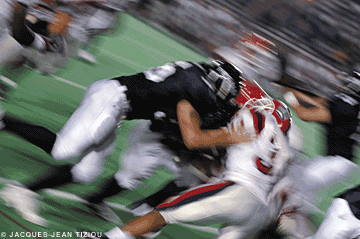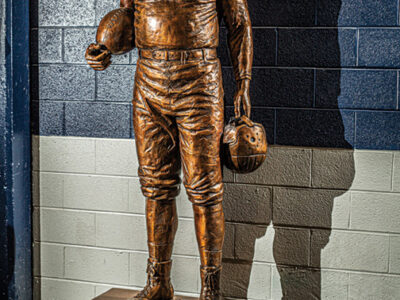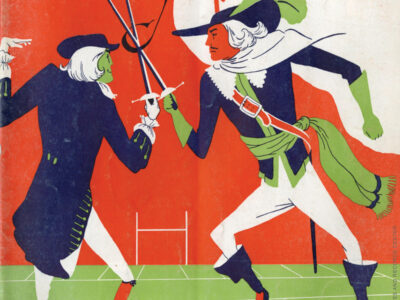
After the Ivies, why not more?
By David Porter
The positive numbers keep piling up for Penn’s football team, which is one year removed from one of its more successful seasons in recent memory but showing no signs of slowing down. A win against Bucknell on October 11 was the Quakers’ 27th in their last 29 games, and extended the team’s winning streak at Franklin Field to 16. That was the longest active home winning streak in the nation.
Four weeks and four victories into the season, Penn had risen to No. 15 in Division 1-AA, and had outscored the opposition 129-67. If there is any dropoff in talent from the 2002 team that finished 9-1, it is not in evidence. There certainly is no evidence of any complacency setting in. “Our focus is to go 10-0,” junior defensive-back Duvol Thompson said before the Bucknell game. “When you think about it, that’s the only way we could improve on last season.”
It seems there is little that can rattle this team. Not a 24-10 deficit on the road at Lehigh, coupled with a lightning storm that halted play temporarily and wound up serving as a catalyst for the Quakers to mount a 21-point comeback and leave town with a win. Nor the loss of senior quarterback Mike Mitchell, who sprained an ankle against Dartmouth in a 33-20 victory on October 4 and missed the Bucknell game. And not the pesky Bison and their elusive quarterback Daris Wilson, who led his team to victory’s doorstep on a balmy day at Franklin Field only to fall short by a missed field goal that probably should have been converted.
Penn hasn’t had to rely on divine intervention too many times in the last several years to earn its victories, so no one should have felt guilty as they watched Ryan Korn’s 39-yard field-goal attempt flutter just short of the goalposts in the final seconds. Yet they could hardly be blamed for seeking some sort of external, if not supernatural, solution to an issue that crops up every couple of years—particularly when a program like the Quakers’ is in ascendance.
Penn fields 33 men’s and women’s athletic teams, and 32 of them are eligible to participate in one form of postseason play or another. Football is the one exception, held sacrosanct by the eight-member Council of Ivy Group Presidents and removed from the postseason equation. No Ivy football team has played in a postseason game since the league was formed in the 1950s. It is a state of affairs that frustrates and confounds some observers, though one that doesn’t seem likely to change.
A story this fall in The Daily Pennsylvanian contained one of the few public statements in recent years by the Council that shed light on the debate. Jeff Orleans, its executive director, referred to the Ivy League’s creation as a league “formed to find the right way to balance athletics and academics,” adding that the presidents “want to be most careful in the way they structured” football—a statement that reinforces the fact that football is treated differently than other sports.
A popular perception holds that it is a concern over the postseason infringing upon final exams that is central to the presidents’ decision, and President Rodin was quoted to that effect in the DP story.
Orleans put the issue a little more broadly in a recent e-mail: “A fundamental principle of Ivy athletics is that athletic activity should be part of the athlete’s overall educational experience, and should not interfere with his or her academic priorities,” he wrote. “Focusing on intra-Ivy competition appears to the presidents to remain the best way, in the sport of football, to support that principle and the various policies that they have adopted to implement it. These policies include a structure for admissions, a commitment to need-based financial aid for all students, and adherence to a 10-game season and to limited spring practice.”
Penn head coach Al Bagnoli echoes what surely are the sentiments of many coaches and players around the league when he wonders whether a more detailed explanation might be forthcoming. “From the outside looking in, it doesn’t make sense,” he said. “It’s an unusual situation when you have all the players and all the coaches in agreement, and virtually all the ADs. And the people who spend the least time on athletics are making the decisions … We’d all feel better if we knew the rationale. Because when I get asked the question when I’m in somebody’s living room, I can’t answer it.”
With the league cutting the number of football recruits and the size of coaching staffs, as well as raising the academic requirements for athletes and restricting off-season practice time, recruiting athletes for a league that doesn’t offer athletic scholarships becomes an even tougher sell. Penn wide-receiver Dan Castles, a junior, said the lack of a postseason component was a factor that weighed against his decision to come to Penn, although he wound up in West Philadelphia anyway instead of at a Patriot League school. Thompson said it’s the cause of jealousy come late winter when the Quaker basketball team makes its annual bid to take part in March Madness.
“We feel like we play 10 games, and that’s enough to show how good we are,” Castles said diplomatically. “But there’s definitely always the question.”
That question may not be answered anytime soon. Orleans confirmed recently that the presidents have not even formally discussed the subject in the last three years. Bagnoli said the coaches have essentially been told by Orleans that it isn’t worth pushing the issue now because it doesn’t have a chance of being passed. Penn athletic director Steve Bilsky said simply, “The presidents have indicated that this is an issue that they’re not changing their position on.”
One need only look at the excitement generated by the NCAA basketball tournament to appreciate the effect a postseason can have. Not just March Madness itself, but the games in January and February that determine who goes and who stays home. The prospect of postseason play would make every football game important, which would in turn create more interest and perhaps bring more fans to Franklin Field. “Ivy champs” has a nice ring to it, but any athlete will tell you he or she wants to take that next step up in class.
Penn has already proved it can play at that level: the Quakers have defeated schools like Colgate, Lehigh, and Fordham that have been to the 1-AA playoffs within the last six years. And it is difficult to fathom Penn being outcoached when it has the coach with the second-best winning percentage in Division 1-AA.
The latter point bears expanding upon. Bagnoli is as good as anyone coaching at this level, and he won’t be here forever. Whether the Ivy League can continue to attract the Al Bagnolis in the future—or lure the kind of players he has been able to recruit up to now—is the real question that should give pause to Ivy League players, fans, and administrators.
David Porter C’82 is the Gazette’s sports columnist and writes for the Associated Press.




